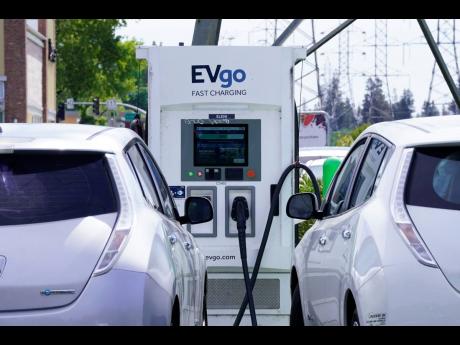Belnavis feels vindicated as local EV push accelerates
WESTERN BUREAU:
Former St Ann’s Bay Mayor Michael Belnavis says the current push for more electric vehicles in the island has vindicated his action to have an $80,000 charging port installed at the St Ann Municipal Corporation for his 2019 Porsche Cayenne Electric-Hybrid motor car in 2020.
Belnavis was forced to resign as chairman of the St Ann Municipal Corporation after he instructed his CEO to use taxpayers’ funds to install the 220-volt charging port at the local authority’s compound to charge his personal vehicle, which was deemed an abuse of his office.
The Integrity Commission also rebuked Belnavis for asking the CEO to deploy public resources for his personal use.
The port was removed after public backlash.
But citing an “unhealthy dependence on oil” in his Budget presentation recently, Finance Minister Dr Nigel Clarke revealed the Government’s goal of having motor vehicles in Jamaica 100 per cent electrically powered by the sun by 2032.
“This would rid us from the kind of oil price vulnerability that we have today and consumers would enjoy much more stable prices to operate their cars,” he said.
Jamaica still lags behind her international counterparts in Europe and North America in its uptake of the more environmentally friendly mode of travel, with car manufacturers globally announcing a gradual move away from making internal combustion engine (ICE) vehicles to electric vehicles, known as EVs. The United Kingdom has indicated that only electronic units will be sold beyond 2030.
Information from Tax Administration Jamaica indicated that only 58 EVs are currently registered to operate on Jamaican roads.
HIGH COST
On the domestic market, the cost of a BYD E6 motor car is $8.75 million, while a sport utility vehicle is for $15 million with an eight-year warranty, but Belnavis is predicting a gradual reduction in the price as more Jamaicans make the switch, especially with the Government’s move to incentivise the first 1,000 purchases annually. Electric car owners will also be exempted from paying annual registration fees.
“This car has been so controversial for me and caused my resignation, but to see this big push by the Government makes me feel vindicated,” Belnavis, the councillor of the Ocho Rios division, said with a chuckle last week.
“When I brought it to the council, people were very critical, not realising that I was saving the council money, and my idea was for every car owned by the municipal corporation to be electric powered because you get a better gas mileage and you don’t have a build-up of carbon monoxide in the cities.
“Early adapters, like myself, will see the vision and move with the technology,” he told The Sunday Gleaner. “Gasolene has become a product of inefficiency and I just thought that I should take a look at an electric vehicle because I knew that the operational cost would be so much less than a vehicle with a combustion engine.”
Belnavis said the car was “so reliable and efficient, you can get miles for nothing”.
EVs are powered by an electric motor instead of a combustion engine. The motor gets energy from a controller, which regulates the amount of power based on the driver’s use of the accelerator pedal. It uses energy stored in its rechargeable batteries.
The Jamaica Public Service Company (JPS) has been at the forefront of driving the EV revolution amid the call for a special arrangement for independent providers to be considered.
The power company has reportedly initiated a three-year project through the JPS Foundation with the Inter-American Development Bank’s innovation unit, the IDB Lab, on rolling out an EV public charging infrastructure nationwide with stations within a 30 to 40 kilometre radius of each other.
MULTI-MILLION DOLLAR INVESTMENT
Another company, InterEnergy Group Limited, has invested approximately $150 million, through local subsidiary Evergo Jamaica, in the roll-out of 60 charging stations across the island. Evergo is a sister company of Jamaica Energy Partners, one of the independent power providers contracted to sell electricity to JPS.
JPS, the monopoly distributor of electricity, has said that it has enough power to charge an estimated 50,000 electric vehicles by 2030, but is hoping to shape the charging behaviour of EV owners to allay pressure on the national electricity grid.
Research shows that lithium-ion batteries emit fewer greenhouse gases and air pollutants than petrol or diesel cars, making it the choice for most EVs, similar to the power source used in cellular phones and computers, but the technology was a challenge for emergency first responders in Europe and the US in the past.
These types of fires are reportedly volatile and can be very challenging to put out, therefore, leaving motorists and passengers at greater risk, but Jamaica Fire Brigade Commissioner Stewart Beckford says his team has undergone training in the management of fires and accidents involving lithium-ion battery-powered vehicles, in a partnership with ATL Automotive Group, and will be ready for any eventualities.
“This is a whole new ball game – a new set of techniques and skill sets that will have to be applied in fighting a car fire that may involve an electric vehicle [and] to extricate persons who may be trapped in these vehicles,” the commissioner said recently.


